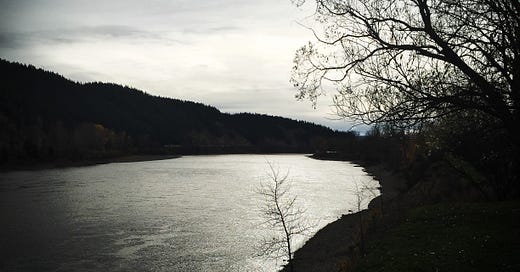On uncertainty
In which Paul's erstwhile project collaborator attempts to discover what he himself is thinking.
There seems to be a lot going on in the world right now, and even normally sanguine folks I know who never hesitate to give thanks for what we have in our part of our world are… well… They seem to be hesitating. Phrases like “TRUST THE PROCESS” seem to land with a thud in our presence.
Yet here we are.
Paul has shared the genesis of the project in the first post of this Substack — his ideas for collaboration are always thoughtful and intriguing — and so I won’t re-hash details here. However, I’m duty bound to ensure it is known that:
The poetry collection I have chosen is the publishing debut (in 2021) of Samantha DeFlitch, entitled “Confluence”; and
When I rolled the dice in the café just after Paul’s turn to roll, the number that came up (and therefore the page) landed on the poem “Open, Like Me”.
Three rivers run through many of DeFlitch’s poems — the Allegheny, the Monongahela, and the Ohio — which also run through the poet’s home town of Pittsburgh. They recall to me some presences I had forgotten were rumbling within, of the two rivers which run through my own birthplace of Prince George BC — the Fraser and the Nechako. I suspect there is something about river water which will make itself felt in images I make/bring, especially as I work through the places that DeFlitch’s poems will have in my project together with Paul.
And this experiment (and all attempts at artmaking should be experiments, IMHO) comes at a time when I begin to acknowledge other dimensions of uncertainty entering my own life. Much of that uncertainty is shared with others, of course, yet some of it just part and parcel of me being me. The past few years of imagemaking have felt like a floundering, playfulness replaced by wistful doggedness. So Paul’s invitation to this collaboration is a wee bit of a lifeline. Thank-you Paul. 🙏
I’ll be using for my imagemaking the advice John Berryman gave to poets:
You should always be trying to write a poem you are unable to write, a poem you lack the technique, the language, the courage to achieve. Otherwise you’re merely imitating yourself, going nowhere, because that's always easiest.
and quite frankly since I don’t quite know where this project will lead, I’m shyly curious to discover where we’ll end up. In order to stay honest, though, I’ll use posts to describe what is going on (or not going on) for me. Maybe that will be a good place to reflect on technique, on visual language, and on what the virtue of courage could mean when we let the cosmos show up as it wants to through our seeing.
The world won’t stop, of course, just because artists do their thing. That same psychic static many of us are hearing/feeling right now will keep circulating through the world and our fingertips and our computers. The very many who are unconscious of blessing will continue to try relieving their uncertainties by compelling others to shoulder the load. And yet, and yet. One of my heroes is Seamus Heaney, the Nobel prize-winning poet from Ireland who died ten years ago in August 2013. He was friends with many leading writers and poets throughout the world, including Vaclav Havel — someone who dealt with some of the worst that could be handed to a playwright in the prime of their life in 1970s and 1980s in communist Czechoslovakia. Heaney was also a gifted critic, and he brought to one of his essays an observation made by Havel in a conversation with a journalist, with the result that many now attribute the sentiment to Heaney (and not Havel). Heaney was writing in 1994 about the peace process in Northern Ireland (which was still very tenuous), knowing how the unthinkable had only recently happened in communist Europe:
Hope, according to Havel, is different from optimism. It is a state of the soul rather than a response to the evidence. It is not the expectation that things will turn out successfully but the conviction that something is worth working for, however it turns out. Its deepest roots are in the transcendental, beyond the horizon. The self-evident truth of all this is surely something upon which a [Northern Ireland] peace process might reasonably be grounded. [from “Cessation 1994”, in “Finders Keepers: Selected Prose 1994-2001”, Faber & Faber, 2002, p. 47]
Indeed: The conviction that there are some things worth working for — however they turn out. I’d like to keep hold of that.
Happy (Canadian) Thanksgiving to all in 2023.



